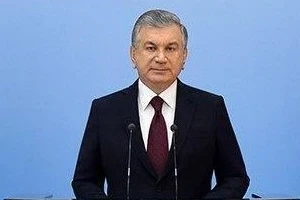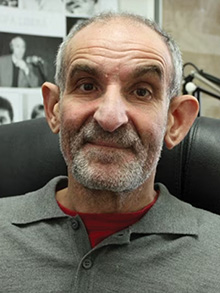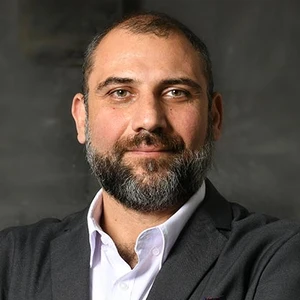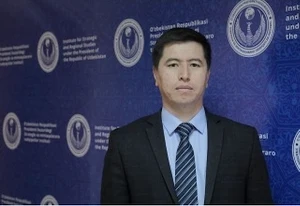
The Multidimensional Foreign Policy of New Uzbekistan  Bakhram Sotiboldiev,
Bakhram Sotiboldiev,
Head of the Department of the Institute for Strategic and Regional Studies under the President of the Republic of Uzbekistan
In today's rapidly changing world, Uzbekistan confidently positions itself as one of the key players on the international stage. The country’s foreign policy, reinvigorated with the election of Shavkat Mirziyoyev as President in 2016, demonstrates impressive results, transforming the republic into a significant center for regional and global diplomacy. READ MORE
- EGF Editor |
Published on EGF: 16.12.2024
| External Relations
-
Georgia’s Post-Election Turmoil: Scenarios for the Future and Regional Consequences  By Eugene KOGAN, Tbilisi-based defence and security expert
By Eugene KOGAN, Tbilisi-based defence and security expert
Georgian parliamentary elections on 26 October 2024 have been highly contested with the opposition claiming that their win was stolen from them by the incumbent Georgian Dream party. As a result, the opposition initiated a legal procedure, demanded new elections and started peaceful protests against the election result, apparently to no avail. On 16 November, Georgia’s Central Election Commission validated the results of October’s highly contested elections, despite weeks of protests by the opposition and accusations of widespread fraud and Russian interference that were refuted by the Kremlin. This AIES Comment provides a perspective based on a combination of issues that highlight not just a divided but also a traumatised Georgian society that remembers the August 2008 war and is not ready to fight Russia again nor to deal with potential Russian interference.
READ MORE
- EGF Editor |
Published on EGF: 13.12.2024
| External Relations
-
The Geopolitical Aspects of the India-Armenia Partnership


 By Nvard CHALIKYAN, Research Fellow, APRI Armenia
By Nvard CHALIKYAN, Research Fellow, APRI Armenia
Benyamin POGHOSYAN, PhD, Senior Research Fellow, APRI Armenia
Verej ISANIANS, Senior Editor, APRI Armenia
The South Caucasus is an important Eurasian political and economic hub, as its transport networks have the potential to facilitate travel across the continent. Control over the South Caucasus grants access to the Black Sea and the Caspian Sea basin, serving as a gateway to Central Asia and the Greater Middle East. Given its strategic importance, regional powers such as Russia, Türkiye, and Iran have vied for influence in the South Caucasus for centuries. In recent years, the demand for alternative transport corridors has surged amid the ongoing Ukraine war, sanctions on Russia, conflicts in the West Asia (Middle East) region, and the resulting difficulties with traditional supply routes such as the Suez Canal. Consequently, the South Caucasus has become increasingly important as a link between Asia, Europe, and Russia.
READ MORE
- EGF Editor |
Published on EGF: 13.12.2024
| External Relations
-
Turkish - Chinese Rapprochement: Growing Chinese Investment in Türkiye  By Vusal GULIYEV, Head of Shanghai Office at AZEGLOB Consulting Group and Policy Expert at the Baku-based Topchubashov Center
By Vusal GULIYEV, Head of Shanghai Office at AZEGLOB Consulting Group and Policy Expert at the Baku-based Topchubashov Center
Although Turkish - Chinese diplomatic relations periodically capture the global agenda due to their fragile aspects, examining the dynamics of economic relations in recent years reveals a different picture. While official Turkish - Chinese relations have been ongoing since 1971, the intensification of mutual economic cooperation dates back to the 2010s. Particularly, with the implementation of China’s Belt and Road Initiative (BRI), which encompasses 140 countries including Türkiye, the number of joint economic collaborations within the framework of international projects between the two countries has increased. Thanks to joint commercial projects carried out in recent years, China has become one of Türkiye’s largest investors and creditors. Chinese multinational companies continue to rapidly invest across various sectors of the Turkish economy. This article systematically analyses the commercial interests and investments of China, which has become one of the world’s largest investors and creditors, in Türkiye, considering the political-economic factors shaping Turkish - Chinese economic relations. READ MORE
- EGF Editor |
Published on EGF: 13.12.2024
| Markets
-
China and the South Caucasus  By Benyamin POGHOSYAN, PhD, Chairman, Center for Political and Economic Strategic Studies
By Benyamin POGHOSYAN, PhD, Chairman, Center for Political and Economic Strategic Studies
China is a relatively new player in the South Caucasus but has growing interests, particularly in the economic domain. While Beijing established diplomatic ties with Armenia, Azerbaijan, and Georgia in the early 1990s, it largely stayed out of the region’s geopolitics. Armenia acquired Chinese-made WM-80 multiple-launch systems in 1999, but they had little impact on the military balance with Azerbaijan. Chinese economic ties with the South Caucasus began to grow in the early 2000s, driven by the rapid expansion of its economy. Interest in the region deepened after President Xi Jinping announced the Belt and Road Initiative in 2013, with the South Caucasus envisioned as a potential land route connecting China to Europe.
READ MORE
- EGF Editor |
Published on EGF: 06.12.2024
| External Relations
-
Will the Fire of the Middle East Expand to the South Caucasus?  By Yeghia TASHJIAN, Beirut-based regional analyst and researcher, columnist, "The Armenian Weekly”
By Yeghia TASHJIAN, Beirut-based regional analyst and researcher, columnist, "The Armenian Weekly”
When on November 24, a U.S.-mediated ceasefire was brokered between Lebanon and Israel, many did not imagine that within days the Turkish-backed Syrian rebel factions would storm Aleppo and capture the city in less than 36 hours. There are a lot of questions about the preparation and readiness of the Syrian army. However, it was clear that the current status quo under President Bashar al-Assad would not be preserved for a long time, as the country was fragmented and in need of conflict resolution, not conflict management. Since the same regional actors involved in the South Caucasus — Iran, Russia, and Turkey — are also in Syria supporting opposite sides, there are concerns that the fire may expand beyond the Middle East. On November 29, the former al-Qaida associated group currently branded as ‘Hai’at Tahrir al-Sham’ (HTS) along with armed factions from the Turkish-backed ‘Syrian National Army’ (some of whom fought as mercenaries against Armenians in the 2020 war in Artsakh) and some mercenaries from Central Asia and the Caucasus entered the second largest city of Syria.
READ MORE
- EGF Editor |
Published on EGF: 06.12.2024
| External Relations
-
In Uzbekistan, strengthening interethnic and interfaith solidarity is always a priority of state policy  Samariddin Sattorov,
Samariddin Sattorov,
Chief Researcher of the Institute for Strategic and Regional Studies under the President of the Republic of Uzbekistan
In recent years, geopolitical tensions have been increasing in different regions of the world, and interethnic conflicts and contradictions on religious grounds continue to worsen.
In the context of such instability, maintaining an open and constructive dialogue between different religious and cultural groups is becoming vital. Strengthening religious tolerance helps to create an atmosphere of mutual understanding, respect and generosity in society, which in turn alleviates tensions and prevents the escalation of conflicts. READ MORE
- EGF Editor |
Published on EGF: 06.12.2024
| Security
-
Uzbekistan exports its products to 115 countries  Export is a key driver of the economy, enabling the development of production, the creation of new jobs, and the growth of GDP. For this reason, every state seeks to support enterprises aiming to expand their exports to international markets. This article explores the comprehensive measures of direct support for exporters in Uzbekistan.
Export is a key driver of the economy, enabling the development of production, the creation of new jobs, and the growth of GDP. For this reason, every state seeks to support enterprises aiming to expand their exports to international markets. This article explores the comprehensive measures of direct support for exporters in Uzbekistan.
Export support in Uzbekistan is carried out systematically, strictly adhering to the goal set in the Uzbekistan 2030 Strategy — increasing the share of the private sector in exports to 60%.
Here are some indicative figures: from 2017 to 2023, Uzbekistan’s total exports reached $120 billion. In 2023 alone, export volumes amounted to $24 billion, marking a 64% increase compared to 2017.
READ MORE
- EGF Editor |
Published on EGF: 01.12.2024
| Markets
-
Implications of the US Presidential Elections for the South Caucasus  By Benyamin POGHOSYAN, PhD, Chairman, Center for Political and Economic Strategic Studies
By Benyamin POGHOSYAN, PhD, Chairman, Center for Political and Economic Strategic Studies
As the US presidential elections approached, pundits and politicians worldwide sought to predict the outcome and explore scenarios for US foreign policy under Kamala Harris or Donald Trump. This was unsurprising: Despite the end of the unipolar world order and significant shifts in the global balance of power, the United States remains the superpower capable of global influence. The South Caucasus was no exception, as pundits debated the potential implications of the election results for the region. The uncertainty ended on November 5, as Donald Trump secured his return to the White House in January 2025. What might the South Caucasus expect from Trump’s second presidency?
READ MORE
- EGF Editor |
Published on EGF: 21.11.2024
| External Relations
-
New Azerbaijan-Iran Railway Agreement Grapples With Regional Tensions
 By Fuad Shahbazov, Baku-based independent regional security and defence analyst
By Fuad Shahbazov, Baku-based independent regional security and defence analyst
On October 15, Chairman of Azerbaijan Railways Rovshan Rustamov arrived in Tehran to meet his Iranian counterpart Jabbar Ali Zakeri Sardroudi to discuss the construction of a railway line linking Azerbaijan’s East Zangezur region and its Nakhchivan exclave through Iran. The meeting came amid intensive diplomatic negotiations between Azerbaijan and Iran regarding the Aras Corridor transit route linking Azerbaijan to Nakhchivan and further to Türkiye via Iran after a period of silence and diplomatic rifts between the two neighbors. The Aras Corridor project, strategically significant for both Baku and Tehran, emerged following Azerbaijan’s persistent efforts after the 2020 Karabakh War to establish regional communication lines, particularly a land route, through Armenia’s Syunik province to Nakhchivan and Türkiye, known as the Zangezur Corridor. The ongoing confrontation between Azerbaijan and Armenia over the land route through Syunik province has been a major point of contention, delaying the signing of a final peace treaty between Baku and Yerevan. READ MORE
- EGF Editor |
Published on EGF: 21.11.2024
| External Relations
-
